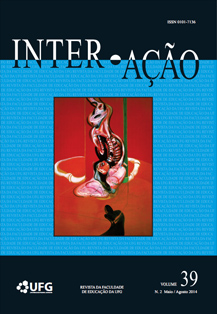A (IM)POTÊNCIA DA EXPERIÊNCIA E DO INDIVÍDUO EM FIM DE PARTIDA
DOI:
https://doi.org/10.5216/ia.v39i2.31712Keywords:
Experiência, Indivíduo, Escola de Frankfurt, Teatro ModernoAbstract
Este ensaio revisita os conceitos de experiência e indivíduo em Adorno, Horkheimer e Benjamin, no que os autores revelam sobre o caráter fragmentário e impotente com que esses conceitos se apresentam na modernidade. Parte-se de tais considerações para refletir acerca da peça Fim de partida, de Samuel Beckett, que se mostra, particularmente para Adorno, como denúncia realista das condições deterioradas de formação do indivíduo. É por meio da forma de paródia do drama que Beckett expõe a dilaceração das possibilidades de contato entre os homens e destes com a natureza e o mundo. A (im)potência da experiência e do indivíduo é o preço a ser pago pela humanidade, que segue seu curso no progresso à custa da morte em vida de todos.Downloads
Downloads
Published
How to Cite
Issue
Section
License
Inter-Ação uses the Creative Commons Attribution 4.0 License for Open Access Journals (Open Archives Initiative - OAI) as the basis for the transfer of rights. Open access means making documents available on the Internet free of charge, so that users can read, download, copy, distribute, print, search, or link to the full text of documents, process them for indexing, use them as input data for software programs, or use them for any other lawful purpose, without financial, legal, or technical barriers.
Authors publishing in this journal agree to the following conditions:
1) Authors retain copyright and grant the journal the right of first publication, with the work simultaneously licensed under the Creative Commons Attribution License, which permits redistribution of the work with attribution and first publication in this journal.
2) Authors are permitted to enter into additional, separate agreements for non-exclusive distribution of the version of the work published in this journal (e.g., for publication in an institutional repository or as a book chapter), with attribution and first publication in this journal.
3) Authors are permitted and encouraged to publish and distribute their work online (e.g. in institutional repositories or on their home page) at any time before or during the editorial process, as this may generate productive changes as well as increase the impact and citation of the published work.















